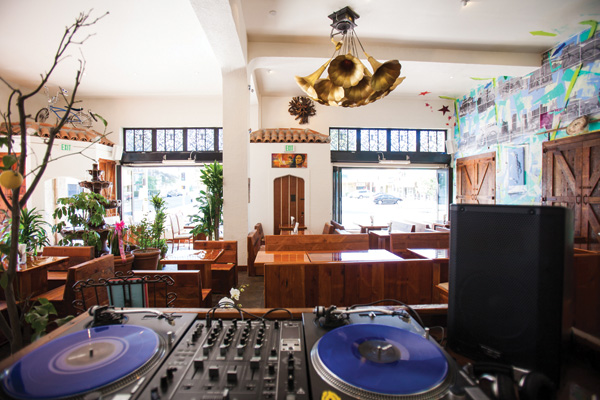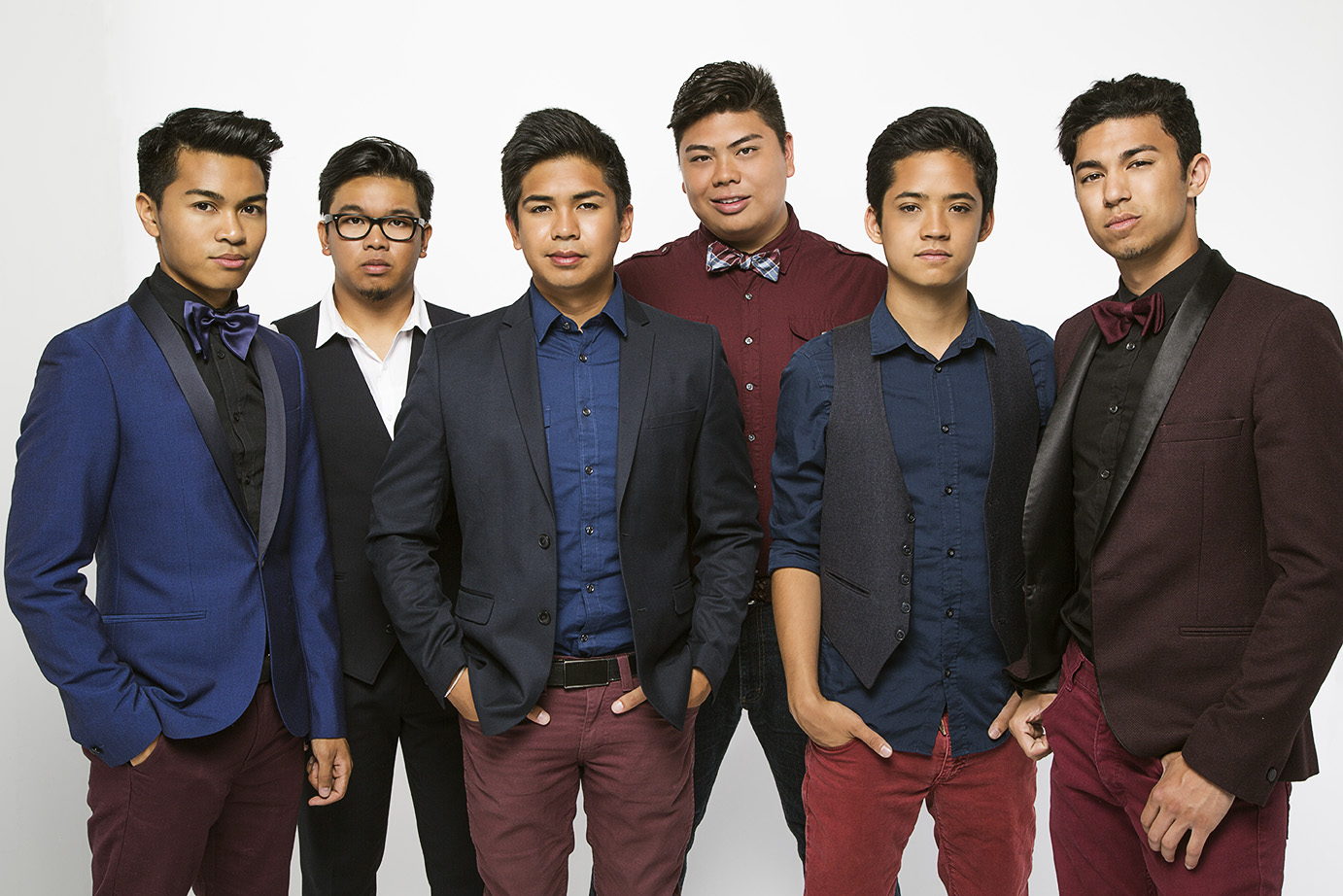Above photo: A view of Escala, a Colombian Korean restaurant, from the DJ booth. (Photo by Jennifer “J-dub” Oh)
by JAMES S. KIM |@james_s_kim
editor@charactermedia.com
Right smack in the middle of Escala, the Colombian-Korean gastropub that moved into L.A. Koreatown’s bustling Chapman Plaza a year ago, sits a DJ booth marked with a disco ball hanging overhead. Its presence is a clear nod to the proprietor’s 20-some years working in the hip-hop music industry.
“I thought about the DJ booth before I even thought about the food,” admits OG Chino, or Chino, as Escala’s owner likes to be called. “Escala started with no concept.”
Fortunately, the entrepreneur’s strong connection to his cultural roots—as a Korean native, raised for eight years in Colombia before moving to Los Angeles—helped him figure out the food and the rest of the conceptual details for the hip late-night spot. Since opening last spring, Escala, which took over the space formerly occupied by the well-known Bohemian lounge, has already made a number of “hottest local restaurants” lists, including mentions in the Los Angeles Times, LA Magazine and Eater LA.
“It just organically became Colombian-Korean fusion,” explains Chino over a glass of beer during the lunch hour on a very sunny March day. “[My business partners] gave me total trust and freedom in thinking up whatever crazy ideas I had. And I’m pretty passionate about my Korean and Colombian roots.”

Escala head chef Chris Oh, left, and owner OG Chino.
In many ways, Escala reflects Chino’s personal identity as a Korean Columbian immigrant who found his passion for music and art in Los Angeles. Beyond the food, the restaurant’s décor is an amalgamation of Colombian architecture and street art, some of which Chino did himself. Customers may even find Chino, who turns 48 this June, rocking his signature fedora while manning the DJ booth from time to time.
Born Kyu-min Lee in South Korea, he was 3 years old when his family immigrated to Bogota, Colombia’s capital, where his father ran a foundation fostering cultural exchanges between the South American country and Korea. The personal exchange wasn’t always easy for Chino, though.
“Being raised in Colombia … I didn’t have any Korean friends at all,” he recalled. “But at home we were raised very Korean. Our food was very Korean; my mom could not cook Colombian food for sh-t. As much as we asked her to, she couldn’t do it.”
When Chino was 11, his family moved once again—this time, to Los Angeles, and settled in what was a very young Koreatown. But with gang culture so prevalent at the time, growing up in L.A. wasn’t easy.
“If you wanted to be cool, you were either in a gang or you were a punk rocker, or something like that,” Chino said. “Because I only spoke Spanish, and I didn’t speak Korean well, I didn’t have any Korean friends. I ended up hanging out with the cholos, the Chicano gangsters. That’s where I got my name from.”
But when the hip-hop wave hit Los Angeles in the late ’70s and early ’80s, it was a life-changing time for the teenage Chino. Rather than rolling with gang members, he immersed himself in hip-hop culture, including buying records, practicing street art and hanging out with the early b-boys.
“Getting out of the gang scene and into the hip-hop music scene in L.A. gave me a whole new passion and gave me guidance: This is what I wanted to do,” he said. “It sounds corny to say, ‘Hip-hop changed my life,’ but this happened at a time when hip-hop didn’t exist in L.A., and we saw it happen.”
 Visitors to Escala can spot the owner, OG Chino, by his signature fedora hat. (Photo by Mark Wales)
Visitors to Escala can spot the owner, OG Chino, by his signature fedora hat. (Photo by Mark Wales)
In 1988, Chino opened B-boy Records, a record store in South Central Los Angeles. Even though the store failed after two years, Chino’s reputation in L.A.’s hip-hop circles led to a meeting with legendary music mogul Rick Rubin, who had left Def Jam Recordings to found Def American Recordings (now American Recordings) in Los Angeles. After an internship with the record label, he was eventually hired as its marketing director. In 1992, Chino promoted his first record: Sir Mix-A-Lot’s “Baby Got Back.”
In addition to marketing, he created album artwork for a number of Def American artists, including Kwest Tha Madd Lad, Chino XL and Art Of Origin. After leaving the label, Chino worked independently as a music promoter and artist, and moved to New York in 1996, because “every hip-hop lover wants to move there at some point,” he says.
Over the years, as part of his work as a music promoter, Chino would organize many late-night parties, and that planted the idea in the back of his mind that one day he might want to open his own bar. So, when his sister, Kay Jin, approached him in 2013 with an open space at Chapman Plaza, the wheels began turning.

B-boy Records. Photo courtesy of OG Chino.
“The space was offered to me to come on board and do something with it—and it already had a bar,” Chino said. So, he left New York and returned to the city that gave him his name.
When it came to who would lead Escala’s kitchen, Chino had an ear to L.A.’s foodie culture, and he knew that people followed chefs like he followed DJs.
“It would have been very easy, and maybe a lot cheaper, getting an older Colombian lady and Korean ajumma in there to cook together, and they would have come up with the perfect fusion,” Chino said. “But instead, I’m investing in Chris [Oh], and so far it’s been great.”
Oh, whom TV viewers may recognize as one-third of the winning team Seoul Sausage, from Food Network’s The Great Food Truck Race Season 3, did his own research on Colombian cuisine and took some notes from Chino, but the resulting menu is very much the chef’s take on Colombian food. “It’s still Chris Oh,” Chino said. “That’s what I like about it.”
And he’s apparently not the only satisfied diner. “We get a lot of Colombian people,” Chino said. “L.A. doesn’t have a Colombian community in one neighborhood—they’re all spread out. Escala has become a place for them to come and gather.”
 Escala’s marinated 16 oz. bone-in rib eye steak. (Photo by Jennifer “J-dub” Oh)
Escala’s marinated 16 oz. bone-in rib eye steak. (Photo by Jennifer “J-dub” Oh)
 Escala’s ceviche, which includes tilapia and shrimp, roasted corn, asian pear, avocado and aji. (Photo by Jennifer “J-dub” Oh)
Escala’s ceviche, which includes tilapia and shrimp, roasted corn, asian pear, avocado and aji. (Photo by Jennifer “J-dub” Oh)
 One of Escala’s signature cocktails, the “El Jefe.” (Photo by Jennifer “J-dub” Oh)
One of Escala’s signature cocktails, the “El Jefe.” (Photo by Jennifer “J-dub” Oh)
For Korean palates, they may find both familiarity and discovery in the kimchi and chorizo fried rice empanada, which comes with a side of kimchi aioli, as well as the K-town Rice Con Pollo, a fusion of kimchi fried rice and Colombian arroz con pollo. For pork belly lovers, the Chicarron & Guac dish offers a change of pace from your regular samgyupsal, as the thick cuts of pork are prepared Colombian-style, along with some freshly prepared house guacamole.
Such creative touches expand beyond Oh’s work in the kitchen to Escala’s every nook and cranny. In figuring out the ambience for the restaurant, Chino went with what he knew and loved.
“I was really inspired by Bogota—its architecture is very beautiful, colonial, but at the same time, rustic, decayed—but decayed in a very organic, beautiful way, with a lot of street art on the walls,” he said.

The phonograph centerpiece, designed by Steven Garcia and OG Chino. (Photo by Jennifer “J-dub” Oh)

The Escala interior. (Photo by Jennifer “J-dub” Oh)
The terra cotta rooftops along the walls and the water fountain, along with the tall, wide windows that remain open with a full view of 6th Street and Kenmore Avenue lend themselves to that theme.
For the interior artwork on the walls, Chino reached out to local street artists, including an old friend who painted his record store back in 1988. Most of the furniture, from the benches and tables to the bar itself, came from reclaimed redwood from East Los Angeles and were built by hand. Escala was a creative space even before it was officially open, and Chino said he takes pride in that.
“I wanted it to be a very multicultural place, and it’s totally that and then some,” he said.
“My father was [behind] a lot of the inspiration for bringing Korean and Colombian cultures together,” he added. “We just talked about the possibility of starting an Escala in Bogota. If I do well here, I think that would be step No. 2.”
___
This article was published in the April/May 2015 issue of KoreAm. Subscribe today! To purchase a single issue copy of the April/May issue, click the “Buy Now” button below. (U.S. customers only. Expect delivery in 5-7 business days).





